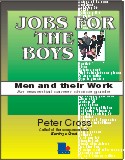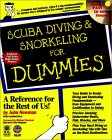Scuba Diving - sample interview
This extract from 'Jobs for the Boys: Men and their Work" features one of Peter
Cross' interviews with a Scuba Diving Instructor. Scuba diving is a fascinating and unusual occupation -
just one of the many you might not have thought of if you have not read Peter Cross' book. And what is
scuba diving?:
"In commercial diving you are doing totality different jobs, you are using welding and
cutting equipment and building underwater, usually using a surface supply, whereas scuba
is putting self-contained breathing apparatus on your back and teaching other people how
to dive and leading other dives. One is generally colder, the other is warmer and clearer."
Sample interview:
Scuba Diving Instructor
Name: Jasper Thorneycroft
Age: 25
Address: West London
How did you get this job?
"I became a commercial diver eight or nine years ago. I did commercial
diving for about five years then I got a recreational ticket as well."
What's the difference between a commercial and recreational ticket?
"In commercial diving you are doing totality different jobs, you are
using welding and cutting equipment and building underwater, usually using a surface
supply, whereas scuba is putting self-contained breathing apparatus on your back and
teaching other people how to dive and leading other dives. One is generally colder,
the other is warmer and clearer."
Can you tell me about the diving school?
"We operate out of a youth club. We have a nice pool and great training
facilities with regard to a classroom and multi-media equipment, which is required for the
running of all the courses. We teach evenings and at the weekends here in London. We
take the students down to the south coast and every three months we take a trip abroad
to places like the Red Sea."
What do you teach novice scuba divers?
"You have an introductory session for those who have never dived before
which is up to two hours in the pool after a briefing. You learn about the dangers
involved, getting a feel for the water and whether you like it, this avoids people paying
money for a course then finding out that they don't like it. The first course is over
four-days. It works out to be a full day in the classroom, going through all the theory
and logic of diving. There's a full day in the pool where you do a whole bunch of skills,
just like driving really, things that you should and shouldn't do. Things like putting
water into your mask and clearing it, given that it can happen at any time. Actually
removing the mask from your face, removing your equipment, maybe it has got loose
underwater, so you have to know how to take it off and put in on underwater. Learning
what position your lungs have in your positioning in the water, it is not an exhaustive
list but it is paramount that you do as many skills in the pool as possible before you
jump into open water, which could be more serious if things go wrong. The you go through
the same skills in the open water with an instructor."
What sorts of people take up scuba diving?
"I'm asked that question many times. I wish there were an average sort
of person. Since Paddi [Professional Assn. of Diving Instructors] brought out the rule
that children above the age of ten can start a full scuba diving course the age range is
from ten to the oldest we've had is sixty-nine. It's more the fitness thing that deters
anyone, there are a list of medical questions you're asked and if you answer yes that
doesn't mean that you can't dive but you have to get checked out by a doctor. That tends
to be the only thing that prevents anyone from diving. Heart problems, breathing
difficulties, asthma, claustrophobia and things like back problems."
How did you get into diving?
"I did my A levels early and didn't have anything I wanted to do with
university. The only thing I was interested in was marine biology, I've always been a
bit of a water boy, playing waterpolo and swimming. I saw an advert for commercial
divers and oil rigs. The training course was only about five months and the money was
very obtainable so I went for it. I loved it. I decided after four of five years of
that and had done all the courses I could do, I wasn't all that infatuated with the North
Sea, although it is a lovely place to work and the money is great I wanted to travel a
bit more with it and the easiest way to travel with diving is to have the recreational
ticket so you can go to all the tourist spots around the world and teach."
If you're in it for the diving, isn't the instructing a pain?
"Diving is one thing but instructing people is another. People wonder why
you'd want to instruct people and spend all your time in a classroom which is basically
not true. If you want to do all the beginners courses, the first three or four courses in
the Paddy, you will spend fifty to sixty percent of that course in a classroom. But the
rest is water work which is what people get into diving for. You get two types of
instructors, those who are only interested in bettering the level of divers who go out
which is at the heart of every instructor, making sure that everyone is safe, and are a
good diver before you can sign them off. And others just want to be able to lead dives
and take experienced divers around dive sets so they don't have huge responsibility for
taking novice divers in the water, more just using their experience to improve other
peoples. If you spend a year in a classroom and the pool you get the experience up and
you meet an amazing cross section of people and come across a huge amount of difficulties
but then you do need to stretch your wings, get back into the water and dive for yourself.
There is an amazing amount of responsibility and you have to be a hundred and ten percent
alert all the time."
Jobs for the Boys: Men and their Work
What is it really like to be a television producer or a master brewer? Is life as a
ship's pilot exciting and carefree or lonely and cold? Does a helicopter pilot have
a better life than a glass blower? Can a flat packed furniture fetish earn you your keep?
Peter Cross, a broadsheet journalist, has turned his concern and curiosity to all
aspects of men's work. The result is an interesting and varied careers book which
breaks new ground. The quality and variety of seventy five personal accounts of what
working in traditional and new media, performing arts, consultancy, business, music,
catering, self-taught crafts and on the high street make this an informative resource.
This is not just an ideal gift for school leavers or recent graduates. Any man fed up
with his daily grind will find ideas and inspiration here.




